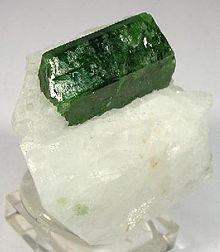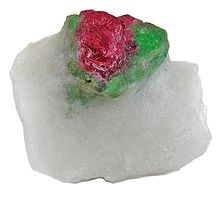Pargasite
| Pargasite | |
|---|---|
 Single crystal of pargasite, 1.5 cm long, on a matrix of white marble from Hunza Valley, Pakistan | |
| General | |
| Category | Inosilicates |
| Formula (repeating unit) | NaCa2(Mg4Al)(Si6Al2)O22(OH)2 |
| Crystal system | Monoclinic |
| Crystal class | Prismatic (2/m) (same H-M symbol) |
| Space group | C2/m |
| Identification | |
| Color | Bluish green, grayish black, light brown |
| Crystal habit | Stout prismatic to tabular |
| Twinning | Simple and lamellar - common |
| Cleavage | {110} perfect |
| Fracture | Splintery |
| Mohs scale hardness | 5–6 |
| Luster | Vitreous |
| Diaphaneity | Translucent, will transmit light on thin edges. |
| Specific gravity | 3.04–3.17 |
| Optical properties | Biaxial (-) |
| Refractive index | nα = 1.630 nβ = 1.640 nγ = 1.650 |
| Birefringence | δ = 0.020 max. |
| References | [1][2][3][4][5] |
Pargasite is a complex inosilicate mineral of the amphibole group with formula NaCa2(Mg4Al)(Si6Al2)O22(OH)2.
It was first described for an occurrence in Pargas, Finland in 1814 and named for the locality.[5]
It occurs in high temperature regional metamorphic rocks and in the skarns within contact aureoles around igneous intrusions. It also occurs in andesite volcanic rocks and altered ultramafic rocks.[2]
Pargasite is the main water-storage site in the uppermost mantle, however it becomes unstable at depths greater than 90 km (56 mi). This has significant consequences for the water storage capacity, and the solidus temperature of the lherzolite of the upper mantle.[6]
It is used as a gemstone.[7]
See also[]
References[]
- ^ Mineralienatlas
- ^ Jump up to: a b "Pargasite" (PDF). Handbook of Mineralogy (pdf). Mineralogical Society of America. Retrieved 2012-12-17.
- ^ "IMA Master List". Archived from the original on 2015-01-05. Retrieved 2014-05-12.
- ^ "Pargasite". mindat.org. Retrieved 2012-12-17.
- ^ Jump up to: a b "Pargasite Mineral Data". webmineral.com. Retrieved 2012-12-17. (Java plugin required)
- ^ Green, D H; Hibberson, W O; Kovacs, Istvan; Rosenthal, A (23 September 2010). "Water and its influence on the lithosphere–asthenosphere boundary". Nature. 467 (7314): 448–451. Bibcode:2010Natur.467..448G. doi:10.1038/nature09369. PMID 20865000. (subscription required)
- ^ Dedeyne, Roger; Quintens, Evo (2007). Tables of gemstone identification (1st ed.). Gent, Belgium: Glirico. p. 169. ISBN 9789078768012. Retrieved 5 November 2020.

| Wikimedia Commons has media related to Pargasite. |
Categories:
- Amphibole group
- Monoclinic minerals
- Minerals in space group 12
- Gemstones
- Silicate mineral stubs